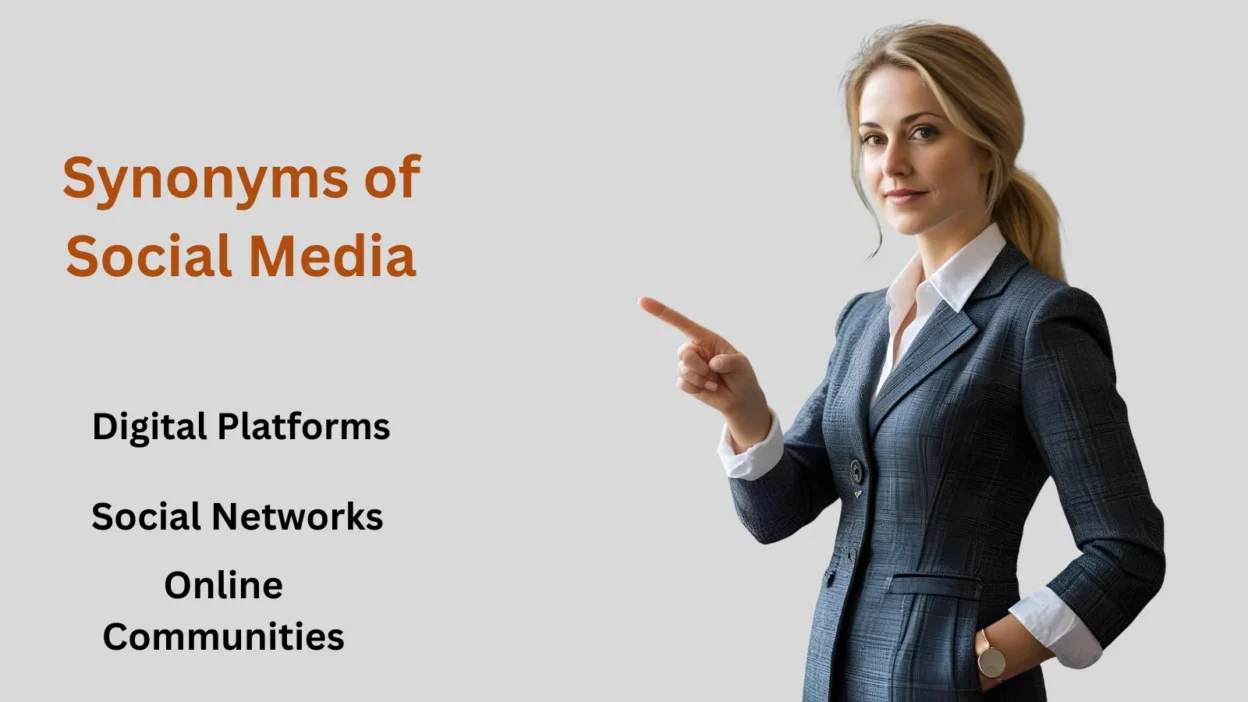Synonyms of social media are useful when you want to talk about online platforms in new and creative ways. Social media is everywhere — from scrolling through Instagram stories to posting updates on Twitter or sharing clips on TikTok. It is more than just apps; it is how people connect, share, and build communities online. That’s why having different words or phrases to describe it can make your writing fresh and clear.
In this article, we’ll explore 30 other words for social media, explain when to use each, and show examples.
You’ll also see how small shifts in tone or culture can change the way these words fit. By the end, you’ll have a richer vocabulary to talk about the digital world with confidence.
What Is Social Media?
At its core, social media refers to online platforms that enable people to create, share, and interact with content and one another. Think Facebook, Twitter, TikTok, LinkedIn, and the like. The word implies connection, sharing, community, and conversation — a digital space where people express themselves and interact.
Social media has traits like being public yet personal, interactive, and real-time. It’s not just broadcasting but engaging.
It’s social in the truest sense — people gathering, sharing ideas, emotions, photos, videos, and opinions.
Synonyms of Social Media and When to Use Them
1. Social Networks
- Meaning: Platforms focused on connecting people through profiles and friend groups.
- Example: Facebook and LinkedIn are popular social networks.
- When to use: When emphasizing personal or professional connections.
- Tone: Neutral and descriptive.
2. Online Communities
- Meaning: Groups of people interacting around shared interests online.
- Example: Reddit is a collection of diverse online communities.
- When to use: When focusing on group interaction and niche topics
- Tone: Inclusive and warm.
3. Digital Platforms
- Meaning: Broad term for any online service where content is shared.
- Example: YouTube is a digital platform for video sharing.
- When to use: When highlighting the technology or platform aspect.
- Tone: Formal and tech-focused.
4. Social Channels
- Meaning: Specific outlets used for sharing content socially.
- Example: Instagram and Twitter are social channels that brands use.
- When to use: In marketing or media contexts.
- Tone: Professional and media-savvy.
5. Virtual Communities
- Meaning: Groups existing in a digital space where people interact.
- Example: Online gaming forums are virtual communities.
- When to use: When stressing the ‘virtual’ or digital nature.
- Tone: Slightly technical and descriptive.
6. Social Media Sites
- Meaning: Websites dedicated to social media activity.
- Example: Snapchat and TikTok are popular social media sites.
- When to use: General, everyday language.
- Tone: Casual and clear.
7. Social Media Platforms
- Meaning: Specific software or services for social interaction online.
- Example: Businesses advertise on social media platforms like Facebook.
- When to use: Formal or business contexts.
- Tone: Professional.
8. Social Web
- Meaning: The web space focused on social interaction.
- Example: The social web has transformed how we communicate.
- When to use: When discussing internet culture broadly.
- Tone: Informal, techy.
9. Networking Sites
- Meaning: Platforms designed primarily for making connections.
- Example: LinkedIn is the leading networking site for professionals.
- When to use: When focusing on the networking aspect.
- Tone: Professional.
10. Content Sharing Platforms
- Meaning: Sites where users mainly share media (videos, photos, articles).
- Example: YouTube is a top content-sharing platform.
- When to use: When emphasizing content distribution.
- Tone: Technical, media-focused.
11. Microblogging Sites
- Meaning: Platforms where users post short updates.
- Example: Twitter is the most famous microblogging site.
- When to use: For short, quick-sharing platforms.
- Tone: Casual to formal.
12. Social Hubs
- Meaning: Central points online where social interaction happens.
- Example: Facebook acts as a social hub for many users.
- When to use: When stressing a community gathering.
- Tone: Friendly, informal.
13. Social Networks of Interest
- Meaning: Communities centered on specific topics or interests.
- Example: Goodreads is a social network of interest for book lovers.
- When to use: When highlighting niche communities.
- Tone: Niche-focused, descriptive.
14. Interactive Media
- Meaning: Media that allows user interaction.
- Example: Social media is a form of interactive media.
- When to use: When discussing engagement and interactivity.
- Tone: Educational, tech-focused.
15. Social Communication Tools
- Meaning: Tools designed to enable communication socially.
- Example: WhatsApp and Messenger are social communication tools.
- When to use: When emphasizing communication features.
- Tone: Neutral, tech-related.
16. Collaborative Platforms
- Meaning: Platforms encouraging collaboration and sharing.
- Example: Slack is a collaborative platform for teams.
- When to use: In workplace or teamwork contexts.
- Tone: Professional.
17. Digital Networks
- Meaning: Online networks connecting users digitally.
- Example: Instagram is a vast digital network.
- When to use: When highlighting technology and connectivity.
- Tone: Formal.
18. Social Interaction Networks
- Meaning: Networks emphasizing interaction between users.
- Example: Facebook is a classic social interaction network.
- When to use: When focusing on interaction.
- Tone: Formal.
19. Media Sharing Services
- Meaning: Services focused on sharing media content.
- Example: Flickr is a media sharing service for photographers.
- When to use: When highlighting the sharing of photos, videos.
- Tone: Casual to formal.
20. Community Platforms
- Meaning: Platforms built for community-building.
- Example: Discord is a community platform for gamers.
- When to use: When discussing group-building.
- Tone: Friendly, informal.
21. User-Generated Content Platforms
- Meaning: Sites where content is created by users.
- Example: TikTok is a user-generated content platform.
- When to use: When emphasizing who creates the content.
- Tone: Informative.
22. Social Sharing Sites
- Meaning: Sites built around sharing content socially.
- Example: Pinterest is a popular social sharing site.
- When to use: Emphasizing sharing.
- Tone: Casual.
23. Digital Forums
- Meaning: Online discussion spaces.
- Example: Reddit is a collection of digital forums.
- When to use: When focusing on discussion.
- Tone: Neutral.
24. Social Broadcast Channels
- Meaning: Platforms used to broadcast content socially.
- Example: Twitch is a social broadcast channel for gamers.
- When to use: Live streaming context.
- Tone: Informal.
25. Virtual Social Spaces
- Meaning: Online spaces mimicking social gatherings.
- Example: Clubhouse is a virtual social space for audio chats.
- When to use: Emphasizing real-time social presence.
- Tone: Trendy, informal.
26. Online Interaction Platforms
- Meaning: Platforms for interacting online.
- Example: Facebook is a popular online interaction platform.
- When to use: Neutral, general.
- Tone: Neutral.
27. Social Media Networks
- Meaning: Networks designed for social media activity.
- Example: Instagram and Snapchat are social media networks.
- When to use: Formal and business contexts.
- Tone: Professional.
28. User Communities
- Meaning: Groups of users interacting.
- Example: Stack Overflow is a user community for developers.
- When to use: Technical or niche community contexts.
- Tone: Informative.
29. Social Ecosystems
- Meaning: Entire systems of interconnected social platforms.
- Example: The Facebook ecosystem includes Instagram and WhatsApp.
- When to use: Corporate or business analysis.
- Tone: Formal, analytical.
30. Networking Platforms
- Meaning: Platforms focused on creating and maintaining networks.
- Example: LinkedIn is a professional networking platform.
- When to use: Business or career-oriented.
- Tone: Professional.
How to Choose the Right Synonym for Social Media
- Consider Your Audience: For a casual blog post, terms like social networks, online communities, or social hubs feel friendly and approachable. In a business report, social media platforms, networking platforms, or digital networks sound more professional.
- Think About Purpose: If the focus is on content sharing, content sharing platforms or media sharing services are more precise. For discussions, digital forums or online communities work better.
- Emotional Tone Matters: Words like virtual social spaces or social hubs imply warmth and community, while social ecosystems or digital networks come off as technical and analytical.
- Cultural Context: In tech-savvy circles, terms like interactive media or user-generated content platforms may be common, but in everyday conversation, stick with social media sites or social networks.
Conclusion
Social media is more than just apps on your phone. It is a space for sharing, talking, and building connections. But you don’t always need to use the same word. Synonyms like digital platforms, online networks, virtual communities, or social channels give you new ways to say the same idea.
Each synonym has its own tone. Digital platforms sound formal. Online networks feel broad. Virtual communities highlight closeness. Social channels sound modern and casual. Choosing the right one helps your writing match the mood and the audience.
By learning many options, you make your writing clear and fresh. It also shows readers that you understand the many sides of the online world.
Next time you talk about social media, try one of these synonyms. The right word can make your message stronger and more engaging.



